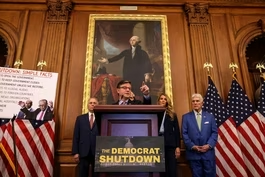
Jesse Jackson's political legacy explored in new book
Clip: 10/27/2025 | 7m 59sVideo has Closed Captions
Abby Phillip explores the political legacy of Jesse Jackson in 'A Dream Deferred'
Rev. Jesse Jackson is a towering figure in the civil rights movement, but his political legacy is less often remembered. The issues he championed in the 1980s still echo in today’s politics, and his influence is the subject of Abby Phillip’s new book, "A Dream Deferred: Jesse Jackson and the Fight for Black Political Power." Geoff Bennett sat down with Phillip to discuss more.
Problems playing video? | Closed Captioning Feedback
Problems playing video? | Closed Captioning Feedback
Major corporate funding for the PBS News Hour is provided by BDO, BNSF, Consumer Cellular, American Cruise Lines, and Raymond James. Funding for the PBS NewsHour Weekend is provided by...

Jesse Jackson's political legacy explored in new book
Clip: 10/27/2025 | 7m 59sVideo has Closed Captions
Rev. Jesse Jackson is a towering figure in the civil rights movement, but his political legacy is less often remembered. The issues he championed in the 1980s still echo in today’s politics, and his influence is the subject of Abby Phillip’s new book, "A Dream Deferred: Jesse Jackson and the Fight for Black Political Power." Geoff Bennett sat down with Phillip to discuss more.
Problems playing video? | Closed Captioning Feedback
How to Watch PBS News Hour
PBS News Hour is available to stream on pbs.org and the free PBS App, available on iPhone, Apple TV, Android TV, Android smartphones, Amazon Fire TV, Amazon Fire Tablet, Roku, Samsung Smart TV, and Vizio.
Providing Support for PBS.org
Learn Moreabout PBS online sponsorshipGEOFF BENNETT: The Reverend Jesse Jackson is a towering figure in the civil rights movement, but his political legacy is less often remembered.
It's been more than 40 years since Jackson launched the first of his two presidential campaigns, yet the issues he championed in the '80s, economic justice, voting rights, and a more inclusive democracy, still echo in today's politics.
His enduring influence on American political life is the subject of journalist Abby Phillip's new book, "A Dream Deferred: Jesse Jackson and the Fight for Black Political Power."
I recently spoke with her about it.
Abby Phillip, welcome to the "News Hour."
ABBY PHILLIP, Author, "A Dream Deferred: Jesse Jackson and the Fight for Black Political Power": Thank you so much for having me.
GEOFF BENNETT: Yes.
In writing this book, what did you set out to correct in the public understanding about Jesse Jackson?
ABBY PHILLIP: The simple answer is, there's been almost an erasure of Jesse Jackson's role in politics.
I think people know a lot about his activism, but they don't know a whole lot about his political chapter.
And this political chapter was far more significant than people realized at the time.
And one of the reasons the book is called "A Dream Deferred" is because the premise is that it took 20 years for at least some of what Jesse Jackson envisioned to come to fruition with Barack Obama's election in 2008 and perhaps even longer for there to be a full understanding of the ideological underpinnings of what he ran on, this kind of economic populist message and also social justice being intertwined.
So there is a sense when I talk to a lot of people that people, if they lived through it, remember that he ran, but they don't think it was - - it mattered that much.
And the book argues that it did have a lasting impact on Democratic politics and American politics in general.
GEOFF BENNETT: And he's lived such a public life.
What was it like separating the mythology from the man?
ABBY PHILLIP: Yes, I mean, look everybody has an opinion about Jesse Jackson.
This is someone who's been a public figure since he was in his early 20s, when he was 24, 25 when he went into Dr.
King's orbit.
And so he's had this incredibly long history and is a very polarizing figure.
And that is a big part of this book, because you can't talk about him without understanding that he was perceived so differently, depending on who you were, whether you were a white American or a Jewish American or a Black American or what have you.
Everybody viewed him so differently.
And so one of the things about this book is that it gives you a broad overview of who is the man.
But, more specifically, it looks at what he was trying to accomplish when he decided to dabble in politics.
And I think that allows us to take a little bit of the noise away from the polarizing nature of Jesse Jackson's broader legacy and just say, what did he contribute to the political life of this country?
And I think that helps for people who are not sure what to think about him.
GEOFF BENNETT: What was he trying to achieve with those historic runs in 1984, 1988?
He registered millions of voters.
He reshaped the Democratic Party.
What was he trying to achieve?
ABBY PHILLIP: Yes, it wasn't clear that he expected to win.
And so many people, especially when he ran in 1984, thought that he was just running a show campaign.
They thought that he was just trying to make a point.
And, in a way, he was.
He first ran for president to send a message to the Democratic establishment that they can't take Black voters for granted.
But what ended up happening was that I think he saw that the message that he was putting out there was having broader resonance than that.
He was going to rural towns in the South and in the Midwest, in Missouri, in Iowa, in Wisconsin.
And white farmers would show up at his rallies.
These burly white farmers who you would never expect to see at a Jesse Jackson rally would show up.
And what started out as an attempt to send a message to the establishment that Black voters mattered turned into more of a movement.
And by the time he got to 1988, he was a very influential figure in the Democratic Party.
He had control over a good swathe of the base.
And so he had a lot of leverage.
He went pretty far.
He came in second place in that campaign.
And there's a part of the book where we talk about the moment that he and his team realized, wait a second, we could win this.
And that was, I think, one of the first times that he really contemplated what it would look like if he actually did become the president.
GEOFF BENNETT: Yes.
You interviewed him for this book.
You spoke with him.
ABBY PHILLIP: I did, yes.
GEOFF BENNETT: What was that like?
What did he tell you?
ABBY PHILLIP: Yes.
I mean, Reverend Jackson now is 84 years old.
And so when I started working on this book, he was in the middle of this -- is in the middle of this battle with Parkinson's.
And it was already at that point apparent that it was difficult to really understand him.
But what really surprised me was how much he remembered.
He really holds on to granular levels of detail about what these campaigns were about, about what he was -- what his mission was, about some of these events.
I went with him to his hometown of Greenville, South Carolina, and he could navigate that town turn by turn, taking you back to where he grew up in the 1950s.
GEOFF BENNETT: Yes.
ABBY PHILLIP: And so it was extraordinary to really hear from him directly what he saw as the connections between his campaigns and where he thinks the Democratic Party ought to go now.
And, in a way, that's sort of the unfinished business.
I don't think that there have been many candidates really in Jackson's mold that have done what he sought out to do.
And I do think he still believes that that could be the ticket for the Democratic Party to regain its footing in the future.
GEOFF BENNETT: I will tell you, when I got this book and I saw the title, I thought, that is a brilliant title.
ABBY PHILLIP: Yes.
GEOFF BENNETT: "A Dream Deferred" from the Langston Hughes poem has so much emotional and historic weight.
What does that mean in the context of Jesse Jackson's life and legacy?
ABBY PHILLIP: Yes, Jesse Jackson started out wanting to be a part of the civil rights movement, really at its peak, at a time when Black people were fighting just for their basic human rights.
And one of the things that he did on behalf of Dr.
King in the late 1960s and early 1970s was add an economic justice piece to that.
And layered on top of that also was telling Black Americans that now, yes, you have the right to vote.
But here's how you can make your vote powerful.
And I do think that that dream of not just empowering Black Americans with that basic right to cast a ballot, but to show them how they can use their political power to change the country, that was Reverend Jackson's dream, and doing so with a sense of solidarity in mind.
I mean, I think he really envisioned that people of all backgrounds would -- could unite underneath a basic economic vision of fairness for working-class and poor people.
And in many ways, that is actually a message that is very much up for grabs right now in American politics.
You hear it on the right and you hear it on the left.
And one of the interesting things for me was just hearing so much resonance in Reverend Jackson's message in the 1980s and what even Donald Trump is running on, what Bernie Sanders is running on, what people like Zohran Mamdani are running on.
These are live issues in American politics right now.
And his campaigns, Jesse Jackson's campaigns, foreshadowed that conversation that we're still having today in the country.
GEOFF BENNETT: Well, the book is terrific, "A Dream Deferred: Jesse Jackson and the Fight for Black Political Power."
Abby Phillip, real treat to have you here.
ABBY PHILLIP: Thank you so much, Geoff.
Thanks for having me.
Hurricane Melissa nears landfall in Jamaica as Cat. 5 storm
Video has Closed Captions
Clip: 10/27/2025 | 5m 18s | Hurricane Melissa nears landfall in Jamaica as Cat. 5: 'This will be unprecedented' (5m 18s)
News Wrap: Federal workers union calls for end to shutdown
Video has Closed Captions
Clip: 10/27/2025 | 5m 11s | News Wrap: Federal workers union calls for end to shutdown (5m 11s)
Sudan's cultural heritage becomes casualty in civil war
Video has Closed Captions
Clip: 10/27/2025 | 8m 4s | Sudan's cultural heritage becomes a casualty in its civil war (8m 4s)
Tamara Keith and Amy Walter on Trump and a 3rd term
Video has Closed Captions
Clip: 10/27/2025 | 8m 3s | Tamara Keith and Amy Walter on Trump flirting with the idea of the 3rd term (8m 3s)
Trump visits Japan's new PM ahead of meeting with China’s Xi
Video has Closed Captions
Clip: 10/27/2025 | 7m 57s | Trump’s Asia tour takes him to Japan ahead of pivotal meeting with China’s Xi (7m 57s)
Vermont town debates building on higher ground after floods
Video has Closed Captions
Clip: 10/27/2025 | 9m 5s | Vermont town debates rebuilding on higher ground after devastating floods (9m 5s)
Providing Support for PBS.org
Learn Moreabout PBS online sponsorship
- News and Public Affairs

FRONTLINE is investigative journalism that questions, explains and changes our world.

- News and Public Affairs

Amanpour and Company features conversations with leaders and decision makers.












Support for PBS provided by:
Major corporate funding for the PBS News Hour is provided by BDO, BNSF, Consumer Cellular, American Cruise Lines, and Raymond James. Funding for the PBS NewsHour Weekend is provided by...





